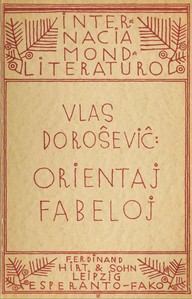Orientaj fabeloj by V. M. Doroshevich
"Orientaj Fabeloj" by V. M. Doroshevich is a collection of fables written in the early 20th century. This work features a variety of stories, likely drawing on themes from Eastern folklore, and employs metaphor to address social and political issues, particularly reflecting on Russian life. The fables seem to feature personified characters, highlighting the eccentricities and moral lessons relevant to their societal contexts. The opening of "Orientaj Fabeloj" introduces the author and
contextualizes his literary significance, detailing Doroshevich's diverse career prior to focusing on his fables. It includes a preface that notes his use of satire and allegory to critique the Russian regime through tales set in the Orient. The first fable presented is about a character named Vero, who wishes to visit Harun-Al-Rashid's palace, reflecting on desires, identity, and the perceptions of beauty. The narrative emphasizes Vero's boldness and the inner dialogue of longing and self-acceptance, setting a tone for the exploration of deeper themes through whimsical storytelling. (This is an automatically generated summary.)
Read or download for free
| How to read | Url | Size | |||
|---|---|---|---|---|---|
| Read now! | https://www.gutenberg.org/ebooks/74405.html.images | 119 kB | |||
| EPUB3 (E-readers incl. Send-to-Kindle) | https://www.gutenberg.org/ebooks/74405.epub3.images | 238 kB | |||
| EPUB (older E-readers) | https://www.gutenberg.org/ebooks/74405.epub.images | 237 kB | |||
| EPUB (no images, older E-readers) | https://www.gutenberg.org/ebooks/74405.epub.noimages | 143 kB | |||
| Kindle | https://www.gutenberg.org/ebooks/74405.kf8.images | 289 kB | |||
| older Kindles | https://www.gutenberg.org/ebooks/74405.kindle.images | 274 kB | |||
| Plain Text UTF-8 | https://www.gutenberg.org/ebooks/74405.txt.utf-8 | 103 kB | |||
| Download HTML (zip) | https://www.gutenberg.org/cache/epub/74405/pg74405-h.zip | 345 kB | |||
| There may be more files related to this item. | |||||
Similar Books
About this eBook
| Author | Doroshevich, V. M. (Vlas Mikhaĭlovich), 1864-1922 |
|---|---|
| Translator | Hohlov, Nikolao, 1891-1953 |
| Title | Orientaj fabeloj |
| Original Publication | Germany: Ferdinand Hirt & Sohn, 1924. |
| Contents | Antaŭparolo -- La fabelo pri Fabelo -- La kalifo kaj la krimulino -- Kiel de Hasan falis la pantalono -- La malĝuste trafitaj kalkanoj -- Historio de porko -- Aldono: Lingvaj notoj de la tradukinto. |
| Credits | Andrew Sly and the Online Distributed Proofreading Team at https://www.pgdp.net (This file was produced from images generously made available by Biblioteka Cyfrowa KUL.) |
| Reading Level | Reading ease score: 67.9 (8th & 9th grade). Neither easy nor difficult to read. |
| Language | Esperanto |
| LoC Class | PG: Language and Literatures: Slavic (including Russian), Languages and Literature |
| Subject | Fairy tales |
| Subject | Satire |
| Subject | Russian literature -- Translations into Esperanto |
| Category | Text |
| EBook-No. | 74405 |
| Release Date | Sep 12, 2024 |
| Copyright Status | Public domain in the USA. |
| Downloads | 203 downloads in the last 30 days. |
| Project Gutenberg eBooks are always free! | |

